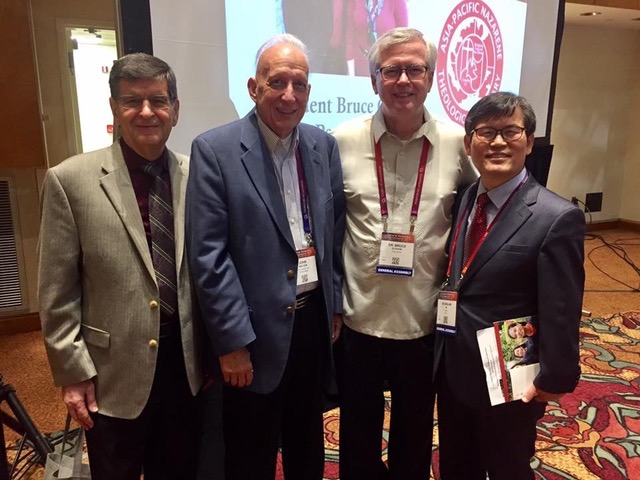In light of recent events nationally, regionally and locally, and in our faith communities, I have been thinking about and editing an earlier blog post on the subject of “Leader and Presence.”
In the book, Cross-Cultural Connections, the author states that “what John 3:16 is to the unbeliever, Romans 15:7 is to the believer.” Romans 15:7 (NIV) reads, “Accept one another then, just as Christ accepted you, in order to bring praise to God.”
Increasingly, this “attitude of acceptance” must identify and define us as Christian leaders, in our homes, on our jobs and in our communities of faith. It is the heart of all we are.
“Acceptance” is the ability to communicate value, regard, worth and respect to others without necessarily agreeing with or embracing their positions, policies, programs, plans or even personalities. It is the ability to make people feel significant, honored and esteemed. To intentionally accept and serve others is to love them. This is leading with the mind and heart of Christ. See also Ephesians 5:1-2.
Acceptance is a profound biblical principle for Christian leaders, especially when good and godly people collide over vision and values in a community of faith.
What is the opposite of acceptance? Is it not rejection, nurtured by apathy? How does the rejection by others make you feel? How do you think the rejection of others makes them feel? How does the rejection of others within a community of faith affect your own relationship to God?
I believe this grace-filled acceptance of others is a core Christian leadership quality that must be cultivated. It is shaped and nurtured by three compelling convictions about:
who we are as the People of God;
what we are to do in the work of God; and
how we live together as the family of God.
These convictions become driving forces within us as we live and lead with an acceptance of others in our homes, neighborhoods, faith communities and in our work assignments.
My brother in law, Dr. Lee Woolery, retired district superintendent of the Northwest Indiana (USA) district, Church of the Nazarene, shared with me several years ago the following quote:
“The most important attribute of a leader is not knowledge or technique but what the leader brings in his/her presence. And the presence he/she needs is a non-anxious presence.”
Edwin Friedman, A Failure of Nerve: Leadership in the Age of the Quick Fix. See also Philippians 4:5-7.
For Christians, this represents Christ-empowered leadership character. To this quality of living and leading we are called, regardless of the nature and context of our leadership assignments.
Increasingly, as we mature in faith, we bring a “non-anxious” presence to the difficult situations we encounter. And, this “presence” is nurtured by a grace-enabled acceptance of others with whom we live, work and perhaps lead.
Some practical lessons on leading others to emerge as we think about accepting others with a “non-anxious” presence:
- Good and godly people often see things differently from their leader.
- Many issues over which we experience conflict are culturally, ethnically, local community, even family-based, and not a violation of scripture.
- Differences that divide us have the potential to alienate members of the body of Christ and to impact negatively the work of God in our communities.
- Caring for those who differ with us is to love, respect, and honor them, as God loves them.
- Acceptance of others implies that we can learn from them.
- We must find ways to communicate acceptance to those who are not yet followers of Christ.
We serve as accepting and “non-anxious” leaders with integrity and grace in the midst of “crucial conversations” as our Christ-led and empowered faith journeys continually transform the way we live in our homes and lead in our communities.
In difficult situations, when you encounter the “reality” of good and godly people differing and colliding with you, where do you place yourself on the following scale?
ACCEPTANCE 1 2 3 4 5 6 7 8 9 10 REJECTION
“What John 3:16 is to the unbeliever, Romans 15:7 is to the believer.”
“Accept one another then,
Just as Christ accepted you,
In order to bring praise to God.”
Romans 15:7
Questions to ponder:
What is your greatest challenge in embracing and modeling an “attitude of acceptance” in your leadership assignment?
Do you agree or disagree with the Friedman quote regarding a “non-anxious” presence? Why?
With which statement in this post are you most comfortable? Uncomfortable?
How would accepting others and a “non-anxious” presence, as outlined in this post, impact, if any, your quality of leadership?
I welcome your comments.
(For more of my thoughts on this theme, see the manuscript and PP presentation, “The Role of Education in Leadership Development: The Character Quality of Acceptance,” a Convocation address to the faculty, staff, and students of the South India Biblical Seminary, Banglapet, India, September 9, 2009, www.BoardServe.org under the “Writings” tab. See also my book, Leading Decisively! Leading Faithfully! Reflections and Markers, Chapter Two.)
E. LeBron Fairbanks
lfairbanks@boardserve.org
June 2020
Lakeland, Florida, USA





